RE/MAX continues to be the authoritative voice in Canada when it comes to all things real estate. Amassing over 2 billion media impressions in 2021 and 7,500+ stories published, we are proud to be the voice of real estate in Canada.
Behind every RE/MAX Report there’s an asset designed for you to share
Over the past few years, RE/MAX has shifted its focus to adapt a broader range of topics for which our network can speak to and provide value. From liveability to affordability to renovation investment reports and our classic housing market outlook reports – there’s sure to be something you can leverage throughout the year to share insights and knowledge with your sphere of influence.
Explore the 2022 RE/MAX Reports
(this list will continue to be updated as new reports are released)
RE/MAX experts give an overview of the national housing market and their insights into 2023
Regional Insights
Explore the interactive map on remax.ca and navigate to individual regional reports for housing markets across Canada (or click the links below for quick access)
Quebec & Atlantic Canada



RE/MAX’s 2022 Canadian Condominium Report examined more than 120 communities in six major markets, including Greater Vancouver/Fraser Valley, Calgary, Edmonton, Greater Toronto, Ottawa and Nova Scotia. The report found that condominium sales were down in the first eight months of 2022 in four markets, including Greater Vancouver/Fraser Valley, Greater Toronto, Ottawa and Nova Scotia, while Calgary and Edmonton reported double-digit sales increases over the same period in 2021. Condo values are up in almost all markets year-over-year, with many bolstered by a robust strong first quarter.
- Buyers from British Columbia and Ontario continue to be active in Alberta’s condominium market.
- The lion’s share of condominium activity is occurring at lower price points. In Toronto, for example, the bulk of condominium apartment sales now hovers in the $500,000–$700,000 range, down from $600,000–$800,000 earlier in the year.
- Condominium markets are losing inventory to an attractive rental market, as would-be sellers simply opt to lease their units long-term.
- Competing offers are still occurring in areas such as Halifax-Dartmouth, although not at the same pace as earlier in the year.

Use These Assets to Share Insights From the Report



RE/MAX brokers and agents are anticipating the national average residential sale price in the Canadian housing market to decline 2.2 per cent in the final months of the year (September-December), according to RE/MAX’s 2022 Fall Canadian Housing Market Outlook Report. This market moderation comes on the heels of rising interest rates, record-high inflation and broader global and economic uncertainties that have impacted consumer confidence and market activity. Read the full report to learn more and share with your clients to keep them informed.


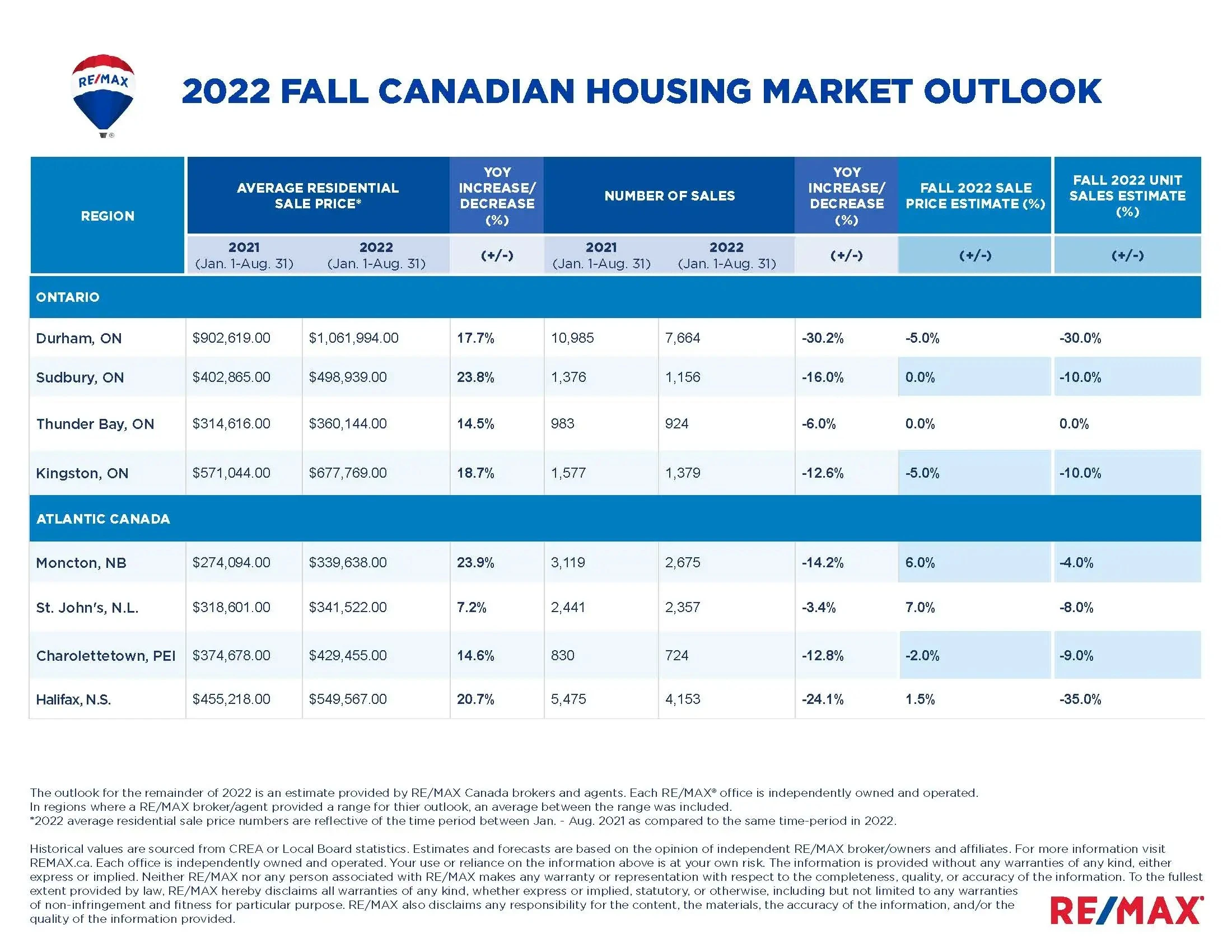
Download these Social Shareables


Inventory levels in major Canadian real estate markets have been dwindling over the past decade, with active listings in July running below the 10-year average in almost all markets surveyed.
- In analyzing the 10-year July average in the decade spanning 2003 and 2012, several Canada real estate markets experienced more active listings than in the most recent decade (2013-2022). These included the Greater Toronto Area (21,243 active listings versus 16,458), Hamilton-Burlington (3,473 active listings versus 2,304) and Greater Vancouver (14,352 active listings versus 12,792).
- Inventory remains key to the overall health of the Canada real estate market—affordable, accessible housing depends on supply. A recent report from Canada Mortgage and Housing Corp. (CMHC) concluded that the country needs to build 3.5 million new homes by 2030 to tackle the affordability issue, yet Canada is averaging only 200,000 to 300,000 new units per year.
- Developer pullback is evident in light of softening demand in the short term combined with current economic and market realities. CMHC noted a decrease in the seasonally adjusted annual rate of housing starts in Canada’s urban areas in July of 2022, driven by lower starts in the single-detached category.



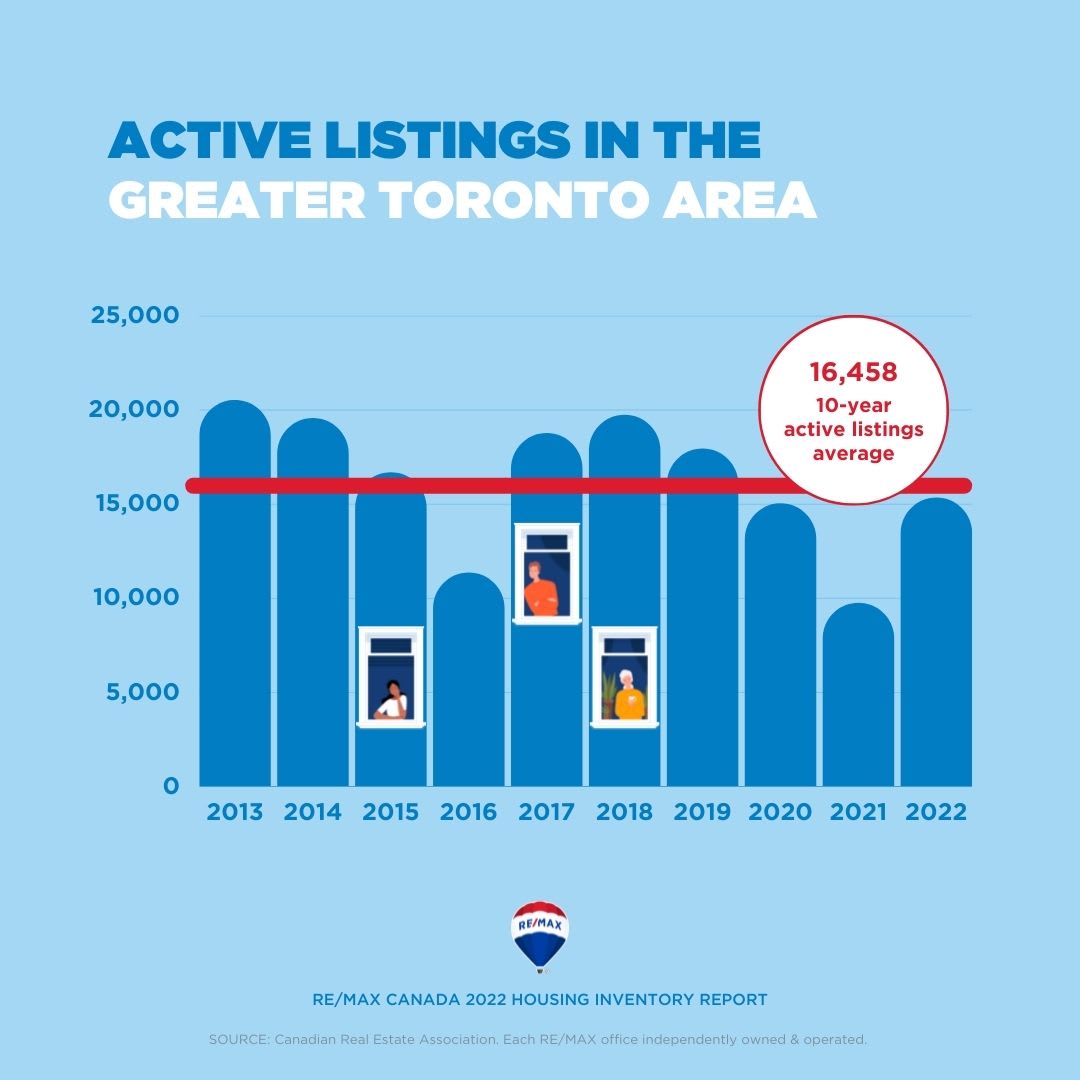
The newly released RE/MAX Canada 2022 Hot Pocket Communities Report compared market activity in the first and second quarter of 2022 in terms of unit sales and prices, analyzing 60 Toronto Regional Real Estate Board (TRREB) districts and 16 regions within the Real Estate Board of Greater Vancouver (REBGV), and six areas in the Fraser Valley Real Estate Board (FVREB).
- Second-quarter detached home sales rose year-over-year in 40 per cent (24/60) of regions across the Greater Toronto housing market, with the vast majority of increases noted the 416 area code (20/60).
- The Greater Vancouver housing market experienced an increase in sales in 31 per cent of regions (5/16), including Island-Gulf, North Vancouver, Squamish, Sunshine Coast and Whistler/Pemberton.






Social Shareables
Download these assets and share on your social channels to help keep your clients informed.


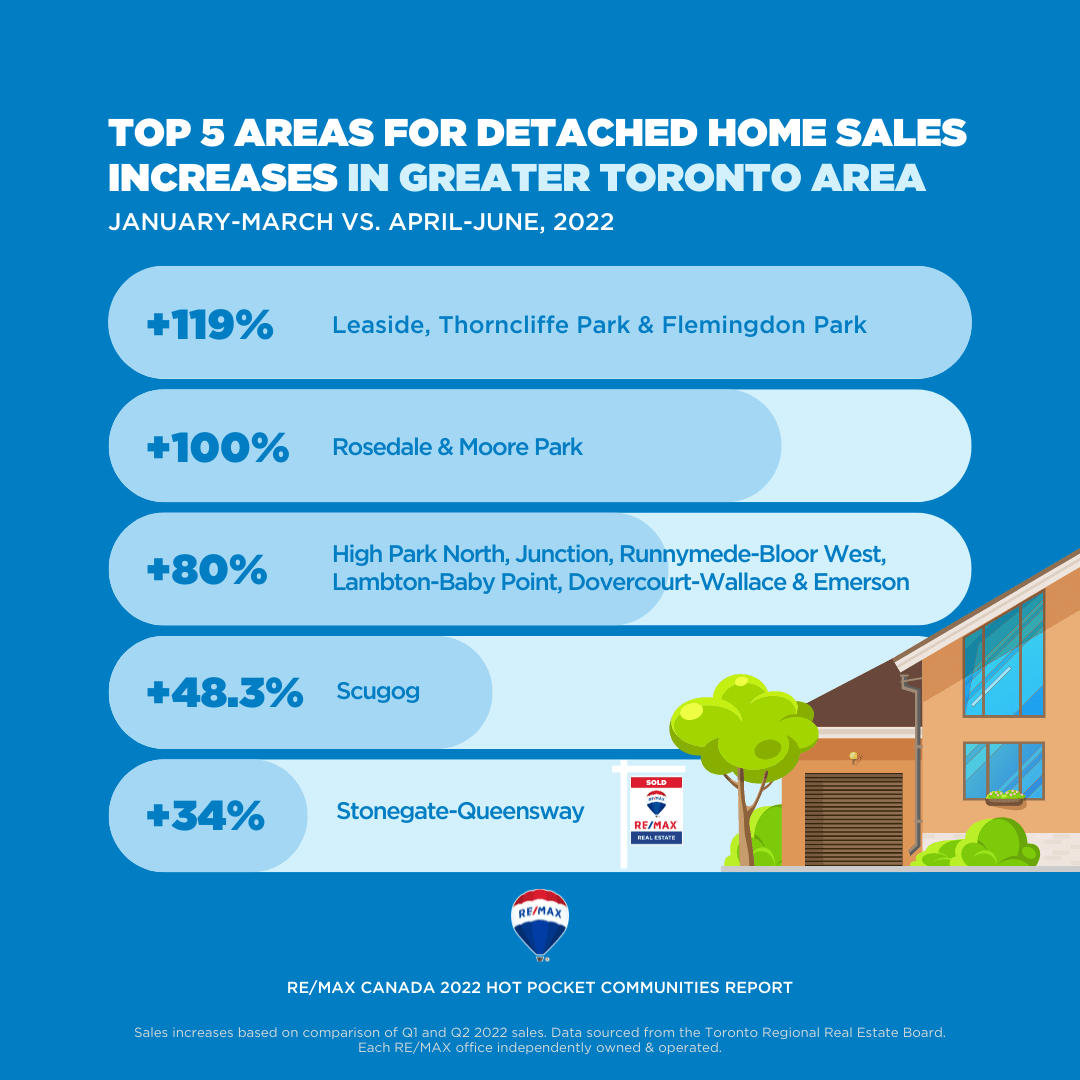

The 2022 Housing Affordability Report reveals that 68 per cent of Canadians are willing to make at least one sacrifice to buy a home they can afford, according to a new Leger survey commissioned by RE/MAX Canada. The most common concession is relocation, as identified by 64 per cent of survey respondents.
- 56 per cent say that moving to a different neighbourhood/community would be one of the top three sacrifices they would make.
- Based on average residential selling price, Brandon, MB ranked as the most affordable market in 2022. This is followed by Regina, SK (which remained on the list year-over-year), St. John’s, NL, Moncton, NB and Red Deer, AB.
- Based on the share of income spent on mortgage payments, Red Deer, AB ranked as Canada’s most affordable housing market, with 25.86% of average monthly income spent on the average-priced home.



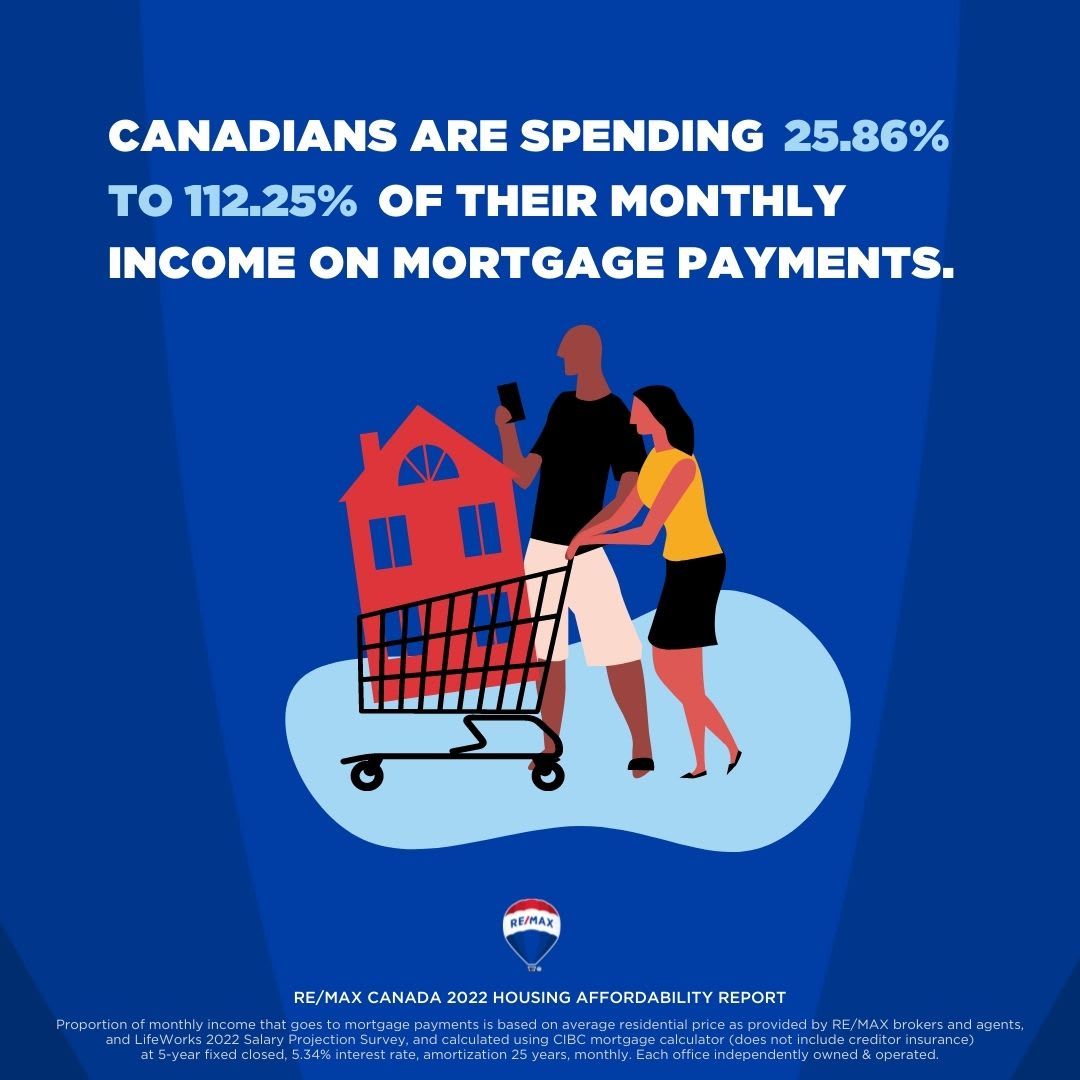

Climate Change
Unlocking the Future, Chapter Two found the impact of climate change on current and future homeowners is already being felt through displacement due to catastrophic events, higher insurance premiums and compromised liveability. The estimated trend of the overall costs of catastrophic losses has increased from approximately $1 billion in 2005 to almost $2.5 billion in 2021 and continues to be on an upward trajectory. With that, RE/MAX Canada collaborated with Kathryn Bakos, Director of Climate Finance and Science at the Intact Centre on Climate Adaptation and Dr. Mike Moffatt, Senior Director of Policy and Innovation at Smart Prosperity Institute, to examines climate scenarios such as floods, wildfires and severe storm events and their impact on the housing market. Chapter two concludes that both climate mitigation and adaptation measures are integral to improving housing affordability, as well as liveability, and should be integrated into a national housing strategy over the next five years.
- Climate change mitigation and adaptation measures must both be integrated into national housing strategies.
- The immediate need to fund and invest in the restoration and modernization of Canada’s green infrastructure, such as wetlands, grasslands and brown infrastructure, including sewage systems, among other initiatives, must become a priority for all levels of government.
- To protect real estate from the disruption of climate change, new levels of transparency in buying and selling homes should be considered by key stakeholders specifically as it relates to the property’s climatic risk.
![1[32]](https://res.cloudinary.com/remax-prod/images/f_auto,q_auto/v1763298845/abh-canada-preprod/132/132.png?_i=AA)

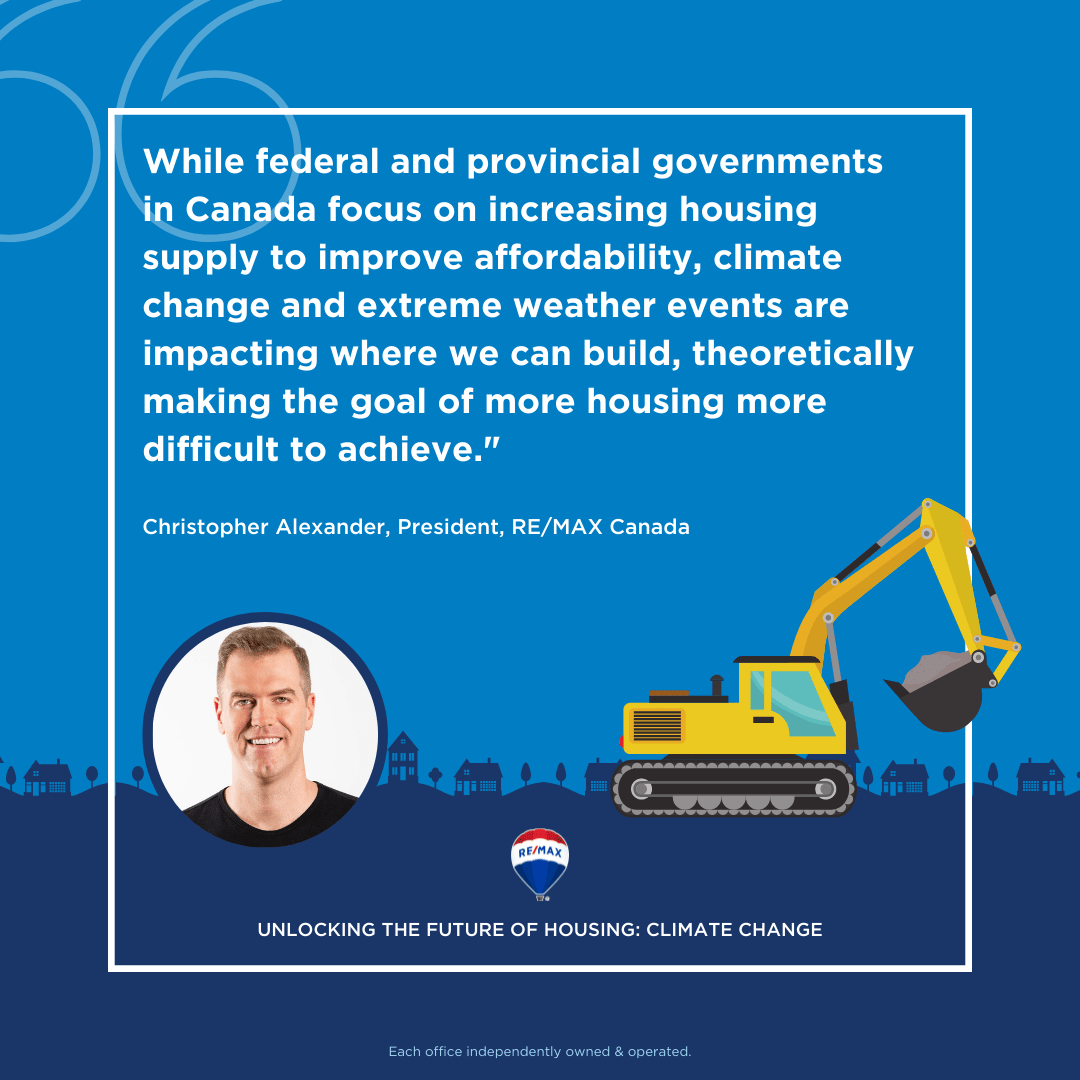
Demand for commercial real estate soars nationwide amidst economic expansion and stock market volatility, according to RE/MAX® Canada Brokers. Investors flock to ‘bricks and mortar’ as hedge against inflation in Q1 2022.



Explore & Share the Regional Summaries
Commercial Real Estate Vancouver
Commercial Real Estate Edmonton
Commercial Real Estate Calgary
Commercial Real Estate Saskatoon
Commercial Real Estate Winnipeg
Commercial Real Estate Hamilton/Burlington/Niagara
Commercial Real Estate Toronto
Canada Housing Market Outlook to 2027
Unlocking the Future, Chapter One examines economic scenarios across interest rates, immigration policy and taxation, in cooperation with Benjamin Tal, Deputy Chief Economist and Jamie Golombek, Managing Director, Tax and Estate Planning, CIBC; and The Conference Board of Canada. This chapter concludes, with caveats, that despite economic headwinds, the housing market in Canada is more stable than many perceive and is likely to sustain stability over the next five years. Though housing prices in Canada will likely remain expensive, price growth may be less extreme than that experienced in the last three years.
- Pragmatic policy across interest rates, immigration and taxation could deliver a stable, albeit expensive Canada housing market through to 2027
- The Canada housing market reflects more than just a commodity or an investment that is measured month-over-month or quarter-over-quarter. And while it is a key economic indicator, the vast majority of existing and prospective homeowners see their home as a long-term financial, as well as emotional, investment.
- This series of reports, done in collaboration with relevant area experts, will be issued through 2022 and will leverage specific “what if” scenarios related to economic policy decisions, climate change, the future of on-premise work and technology, and how they may impact the housing market in Canada



Exceptional gains in Greater Toronto housing market fuelled by rapid population growth, land scarcity and low interest rates
Average price increased more than 450 per cent, while unit sales have doubled since 1996
Residential unit sales in the Greater Toronto housing market have doubled and average price has increased more than 450 per cent since 1996, as strong demand and limited supply continue to drive rapid price escalation throughout the 416 and 905 area codes, according to a new report released by RE/MAX Canada.
Use These Assets to Share Insights from this Report


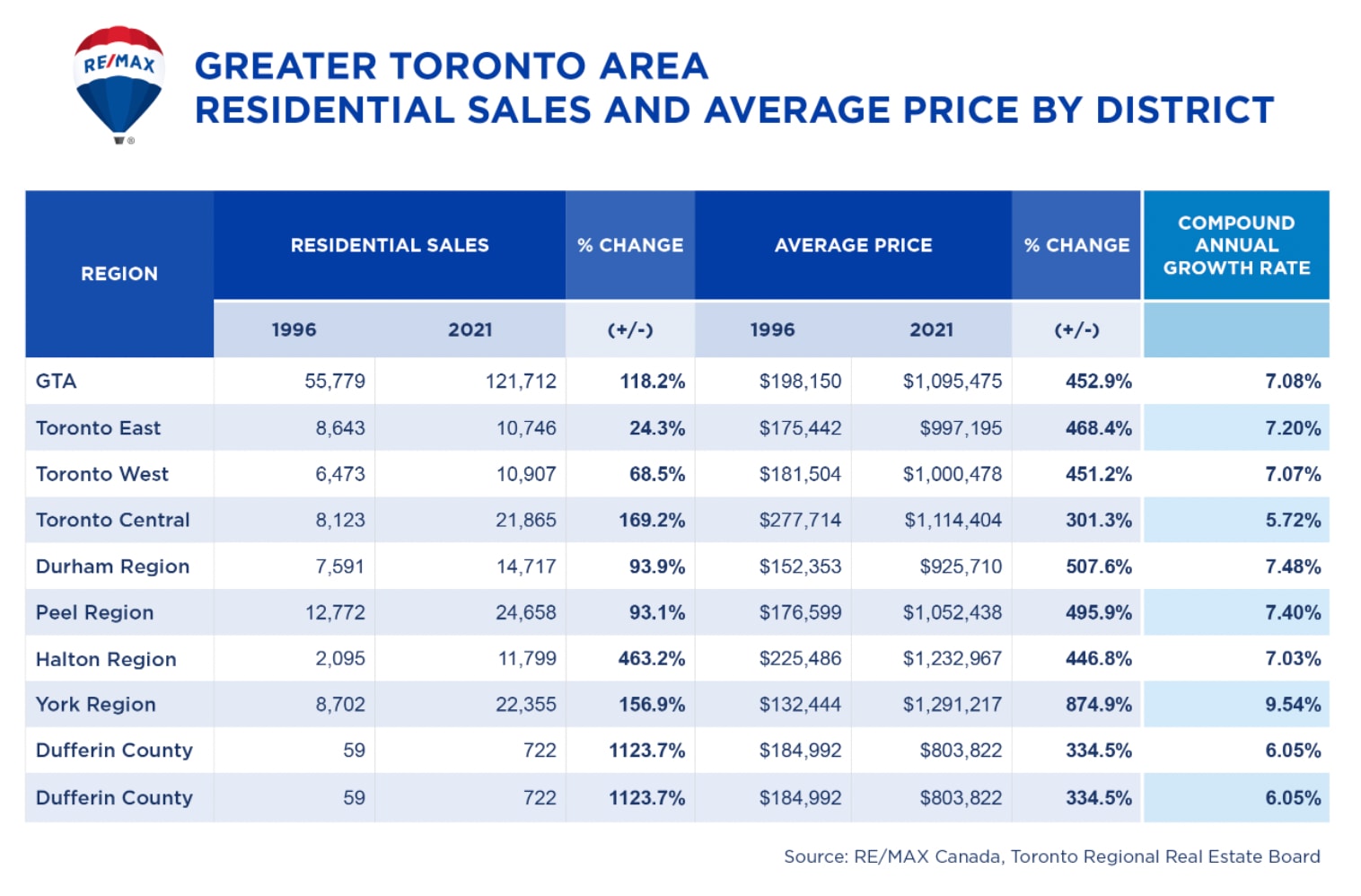
Canadian Luxury Real Estate Sales Double, Triple in Some Markets
Pandemic accelerated value of home ownership at luxury price points to new heights in major Canadian centres in 2021.
Demand for Canadian luxury real estate shifted into high-gear from coast to coast in 2021 as both domestic and non-resident consumption of tangible assets, such as homes, reached new levels, according to a report released today by RE/MAX Canada.
Use These Assets to Share Insights From the Report



These “Small” Canadian Real Estate Markets Are Booming
Liveability in small Canadian real estate markets eclipses relative affordability
- Price growth expected in all small markets analyzed, with average increases ranging from 3% to 20% in some areas
- Quality of life factors, or “liveability,” are drawing many Canadian homebuyers to small markets (40 per cent); followed by housing affordability (37 per cent)
- More than a quarter of people living in larger markets (28 per cent) would like to move to a smaller market in the next two years
- A quarter of Canadians (25 per cent), have received family support to purchase their first or current home; this number is consistent in large and small markets
Use These Assets to Share Insights From This Report



Canadian Real Estate Prices Expected to Rise 9.2% in 2022: RE/MAX
Confidence continues in Canadian real estate market, with the inter-provincial relocation trend likely to remain strong in 2022
- Migration between provinces expected to continue in 2022, potentially impacting local Canadian real estate conditions, according to 53 per cent of RE/MAX brokers (20 out of 38)
- 49 per cent of Canadians believe the housing market will remain steady in 2022 and view real estate as one of the best investment options over the next year
- Some of the highest outlooks are anticipated for Atlantic Canada, with Moncton and Halifax projecting average residential sales prices to increase by 20 per cent and 16 per cent respectively in 2022
- 97 per cent of regions (37 out of 38) surveyed are likely to remain seller’s markets in 2022
Use these Assets to Share Insights with your Clients

National Social Stats

Regional Market Infographics

Designed National Data Table
